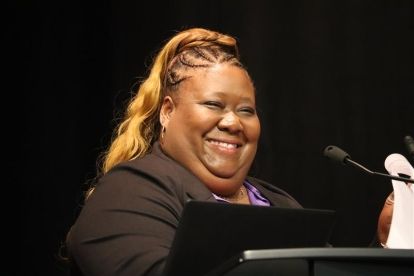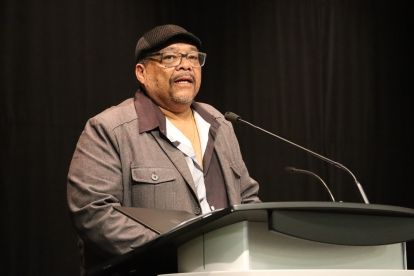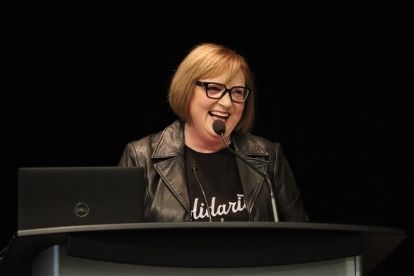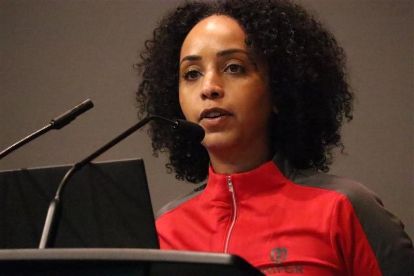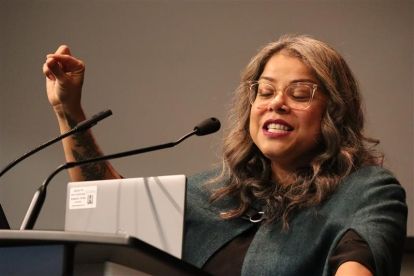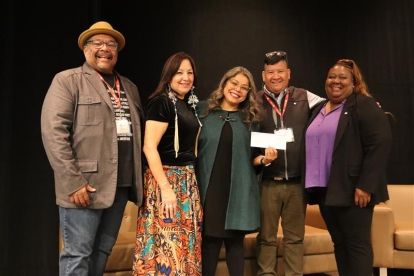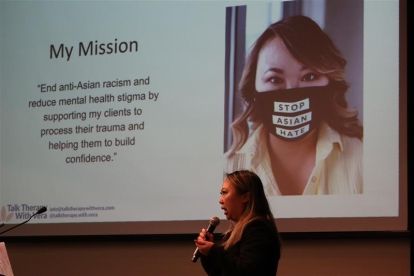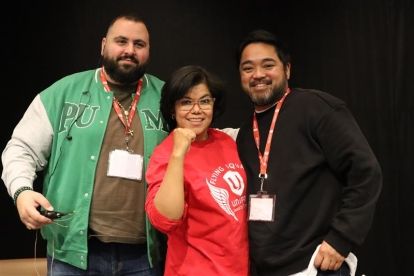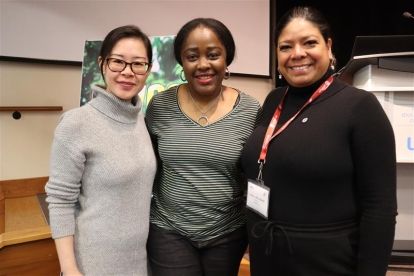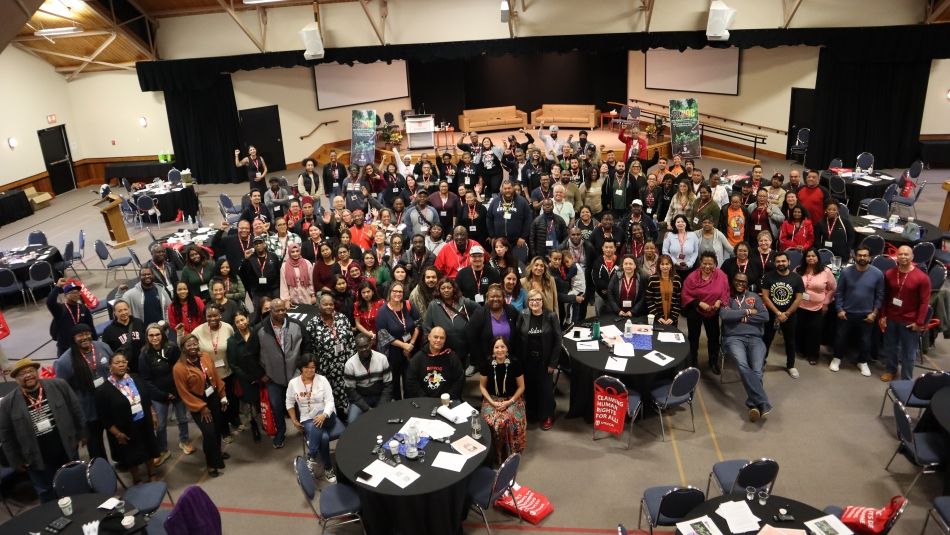
Share
Sometimes, for big ideas to grow, all it takes is a seed to be planted.
This year’s Black, Indigenous and Workers of Colour (BIWOC) Conference central theme was “United for healing, peace and solidarity,” where delegates were encouraged to share innovative ideas on community-driven strategies to break down barriers.
“We’re the soil. All the things that we carry with us is what is going to make us grow together. We need strong roots in order to build strength and we’re going to build this together,” said Unifor Human Rights Representative Tricia Wilson.
“We must remember that other groups, though less visible, endure severe hardships and it’s essential to uplift all voices.”
This year’s BIWOC Conference, held at the Unifor Family Education Centre in Port Elgin, Ont. on Oct. 25 to 27, 202, celebrated its biggest turnout yet with nearly 200 attendees.
"This is your house," Dereck Berry, Unifor BIWOC National Executive Board member, told delegates. “This is a safe place.”
In her address, Unifor National President Lana Payne thanked BIWOC committee members who are elected in all regions for their work to build the union and connect members of BIWOC communities in every place where the union can be found. She also encouraged locals to apply for the Local Union Equity Fund.
Last month, Payne joined Unifor Indigenous Relations Officer Gina Smoke at the Drag the Red project in Winnipeg to search the river for missing and murdered Indigenous women and girls.
“I can’t tell you how difficult this experience was for me. But also, how amazing it was to witness these women turn grief and loss into action – one that is about healing, about hope, and about reconciliation,” she said.
“Whether you’re walking in Tears to Hope, or participating in a Black History Month event, or running a local union equity campaign, or fighting Anti-Asian hate, I want you to continue using this union as a way to make this world a better place for all of us.”
Payne also emphasized that the union will vehemently protect free collective bargaining and the right to strike. Despite passing the federal government passing anti-scab legislation earlier this year, the right to strike has been under attack.
"I can guarantee you that is a sure-fire way to have no labour peace in this country," said Payne, if employers or a Conservative government tries to stifle collective bargaining rights or the right to strike.
"We are not going backwards."
On Friday night, Elder Shirley John opened the conference with an Indigenous welcome and a powerful drumming circle performance.
In her address, Unifor Ontario Regional Director Samia Hashi told delegates that the work they're doing in workplaces and in their communities is "pushing through glass ceilings and building a stronger future for all of us."
“When I reflect on the past year, we’ve been doing a lot. We’ve achieved a lot together as a union,” she said.
“For the first time, we hosted our national Black History Month, uniting members from coast-to-coast-to coast. Our BIWOC Committee has been engaged in every step in supporting powerful events – elimination of racism and Islamophobia, honouring Indigenous Peoples Day, and paying tribute to the loss of children and residential school survivors during the National Day for Truth and Reconciliation.”
She said moving forward, it’s critical for BIWOC members to be engaged as voters.
“The issues we talk about – affordability, housing and health care, Indigenous rights, anti-Black policies – these are all things we want to act on,” she said. “We also need to uplift progressive leaders, whose values align with ours.”
Later that evening, delegates heard from a panel about how the union and members can make a strong impact at polling stations and create real change, including designating battlegrounds of aggressive door-knocking efforts and texting campaigns.
On the second day of the conference, Nrinder Nann, the first person of colour elected to Hamilton City Council, shared her journey from a community organizer to a city councillor. She spoke about her work to fight hate and racism in communities and workplaces, prompted by the hate-motivated killing of a Sikh elder in B.C. by white supremacists in 1998.
Her decade-long career in the labour movement in Canada and the U.S., including working alongside Canadian Auto Workers union leader Bob White, eventually led her to contributing to the first Barack Obama U.S. presidential campaign, where she saw most workers were Black and people of colour and “we weren’t the exception in the room.”
But it was the realization of self-care, particularly in marginalized groups, that is important because “if we cannot take care of ourselves. We cannot fight for others,” she said.
Nann’s shift to politics began at the City of Toronto where she recognized her need to “fight from the inside to make tangible change.” She was elected as Ward 3 Councillor in Hamilton in 2022.
“Solutions to the compounding issues [that affect the] community will not come from the people who observe oppression. It will come from those who are living it,” she said.
“I’m honoured to serve, but I have to tell you all, it’s not easy. There are a lot of vitriol, a lot of trolls,” she said. “It’s not about titles, or about positions of power – it’s the impact we can make. It’s about lives we will touch.”
Unifor presented a cheque for $1,000 to Nann to support SACHA, a sexual assault centre that services Hamilton and surrounding areas.
The South Asian Women and Immigrants' Services (SAWIS) gave space to voices about the challenges and harsh conditions newcomers face in Canada, including being excluded from finding affordable housing, accessing childcare, a living wage in a safe workplace, and Employment Insurance.
“We need our dignity, we need human rights,” said SAWIS Executive Director Sultana Jahangir. “We are fighting for this social justice.”
The Ontario Regional Council has donated $2,500 to SAWAIS to help bolster their programs and work.
Delegates participated in two break-out workshops on mental health and racial justice and labour community solidarity.
Keynote speaker and registered social worker Vera Cheng did a deep dive on dismantling anti-Asian racism. She shared her own experience with feeling like "not enough," while growing up with tiger parents and explained the dangers of the Asian model minority myth – a stereotype which has characterized the Asian population as high-achieving economically and educationally.
“Asian-Canadians are more likely to face mental health issues because of increase of racism and discrimination and many Asians felt the pressure of living up to the model minority stereotype that can worsen their mental health – and in some cases, lead to suicide,” she said.
Cheng began the "Stop Asian Hate" mask campaign in 2021 after the Atlanta spa shooting because she wanted to speak up and create awareness of the significant rise in Anti-Asian sentiment.
“After the pandemic began, there were over 1,500 hate crimes reported against the Asian community in Canada and unfortunately, Indigenous people who were mistaken as Asian, were also facing hate crimes,” she said.
She also provided resources for the group to bring broader dialogue for self-care and self-love – including therapy, breathwork, and emotional regulation – and guided the room in a five-minute meditation.
On the last day of the conference, Ontario Regional Director Samia Hashi moderated a panel on a journey through activism.
"We are tired of being bystanders, we want to be heard," said panelist Maria Chinelli from Unifor Local 222. "I want to be part of the solution. So, I get up and try to get involved. If you have the passion and courage…we are workers of colour. We have the passion and courage to make change."
Panelist Chris Santos, a Unifor National Representative, said he brings lessons from the courses he receives at Unifor’s Port Elgin Family Education Centre can benefit his community outside of the union by leading by example.
“People of colour look to me to be their voice,” he said. “The change we bring to the world isn't just within the workplace…Next thing you know, you have a whole solidarity parade behind you."
In her final remarks, Unifor Human Rights Representative Tricia Wilson said there were lots of stories of healing, solidarity and peace shared throughout this weekend.
"Let's keep moving forward, because we sure aren't moving back!" she said.


